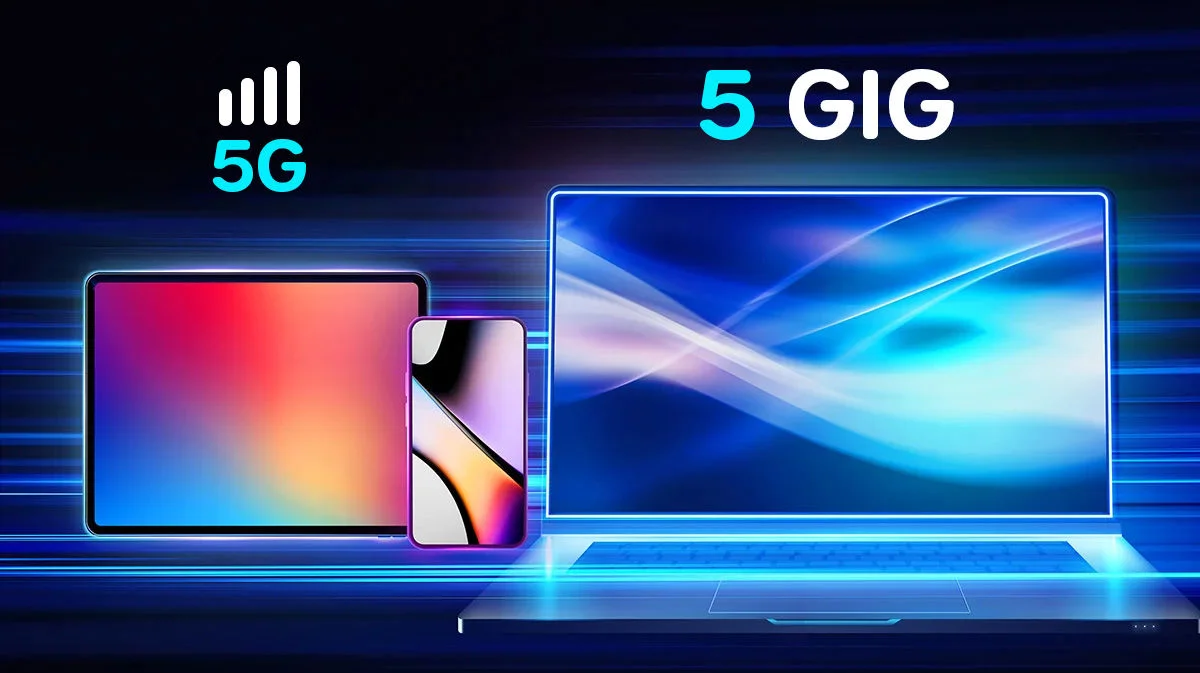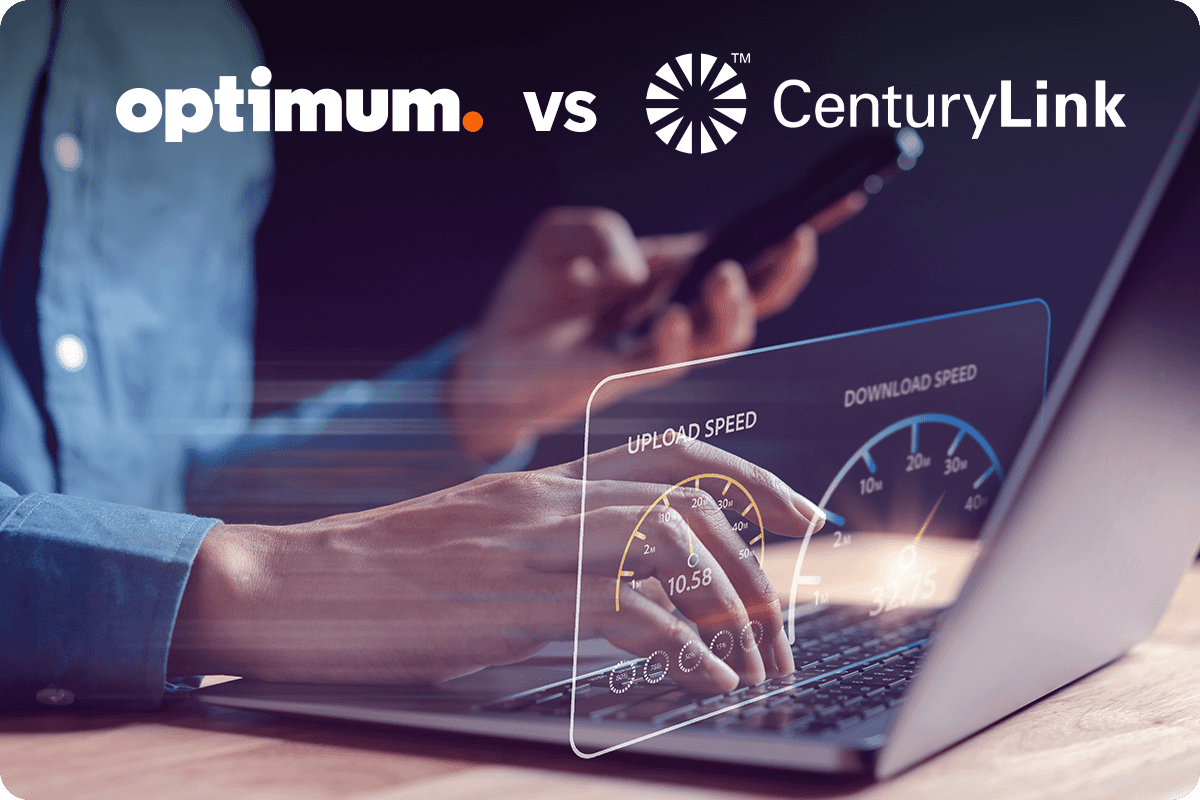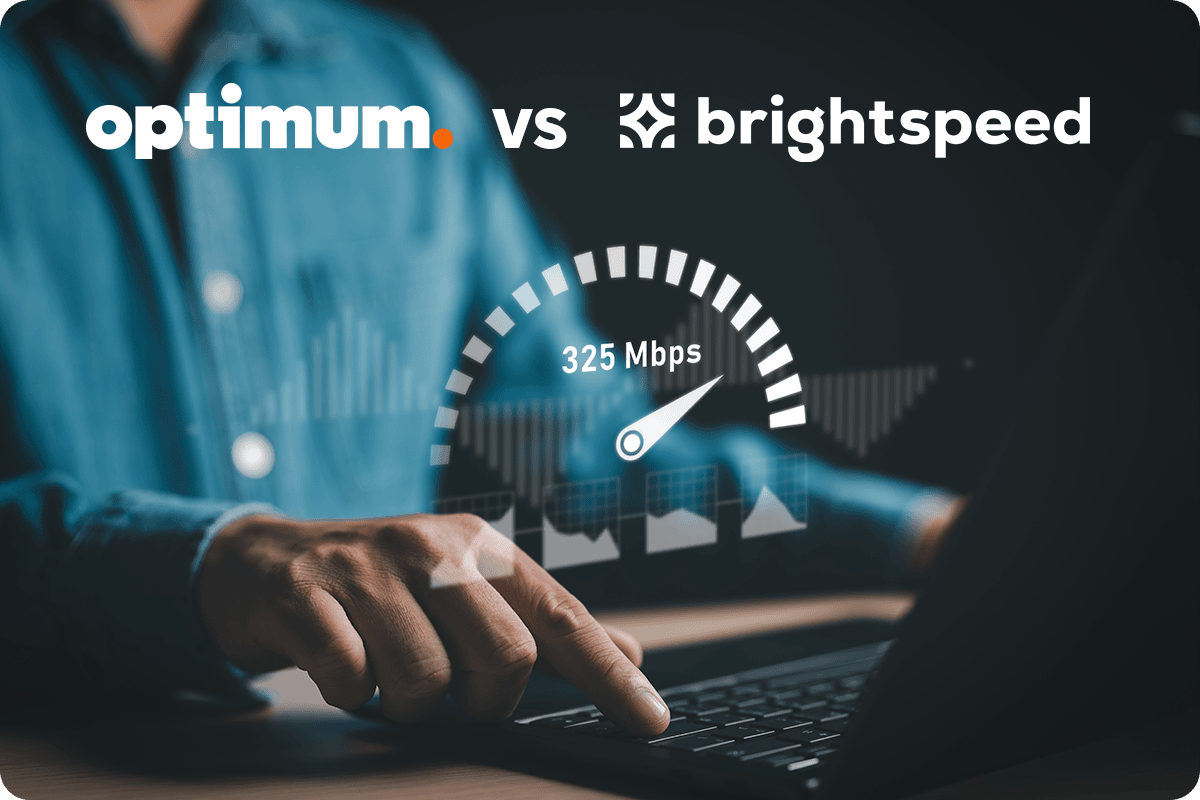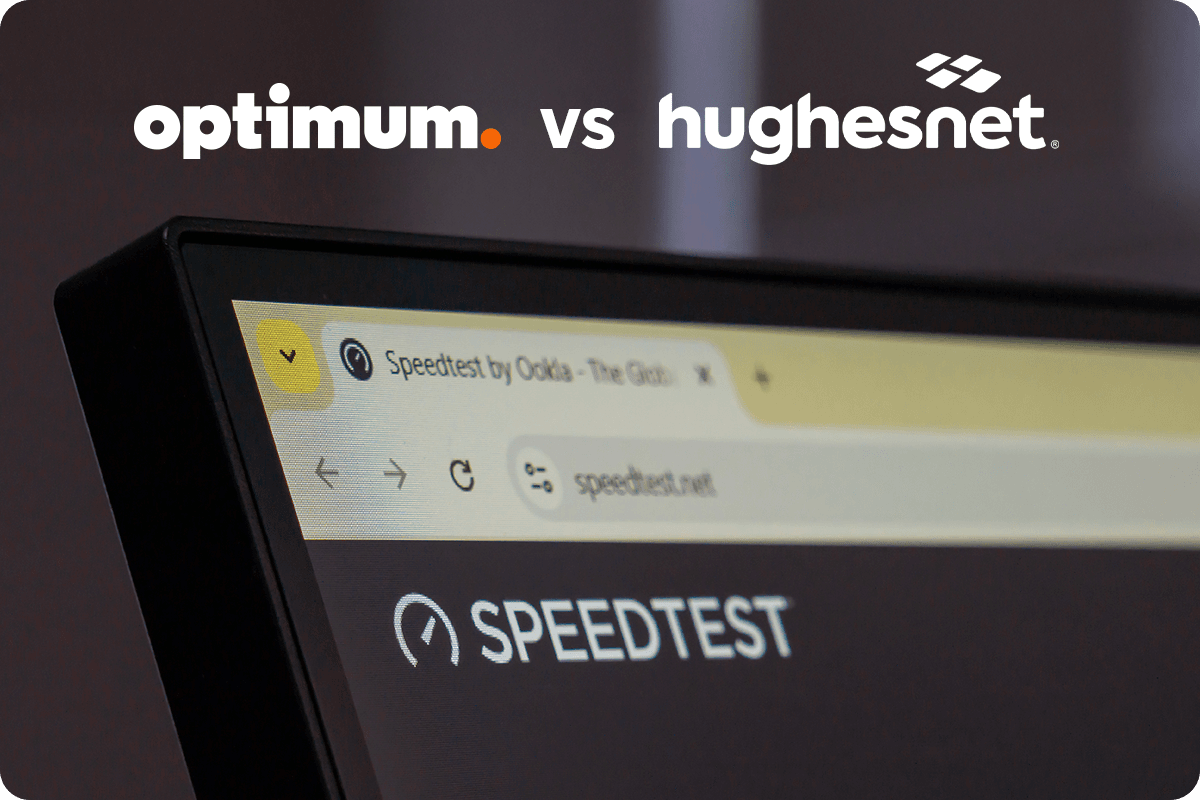Articles
Stay up to date with the latest news, read helpful articles, and find how-to guides

Optimum Internet or 5G Home Internet: Which to Choose?
- Read Time: 8 min.
- Internet
- December 11, 2025
Choosing the Right Internet Speed for Your Home
- Read Time: 7 min.
- Internet
- December 11, 2025
5 Gig Fiber vs 5G Home Internet: Understanding Your Options
- Read Time: 10 min.
- Internet
- December 11, 2025
Recommended Internet Speed for Live Streaming
- Read Time: 13 min.
- Internet
- December 04, 2025
Celebrate the Victoria Optimum Store Grand Opening
- Read Time: 1 min.
- Communities
- November 21, 2025
- All
- Communities
- Internet
- Mobile
- TV
- All
- Communities
- Internet
- Mobile
- TV
- All
- Communities
- Internet
- Mobile
- TV

Optimum Internet or 5G Home Internet: Which to Choose?
- Read Time: 8 min.
- Internet
- December 11, 2025

Choosing the Right Internet Speed for Your Home
- Read Time: 7 min.
- Internet
- December 11, 2025

5 Gig Fiber vs 5G Home Internet: Understanding Your Options
- Read Time: 10 min.
- Internet
- December 11, 2025

Recommended Internet Speed for Live Streaming
- Read Time: 13 min.
- Internet
- December 04, 2025

Celebrate the Victoria Optimum Store Grand Opening
- Read Time: 1 min.
- Communities
- November 21, 2025

2025 Guide to the Best Mobile Phone Cameras: iPhone 17, Galaxy S25 & Motorola Razr
- Read Time: 6 min.
- Mobile
- November 20, 2025

CNN All Access: Stream Live News, Exclusive Shows & More
- Read Time: 4 min.
- TV
- November 19, 2025

Your Essential Guide to Buying Your Child’s First Phone
- Read Time: 8 min.
- Mobile
- November 13, 2025

Meet Santa & Friends and enjoy giveaways at your local Optimum Stores
- Read Time: 1 min.
- Communities
- November 11, 2025

We’re Gifting Big Apple Connect Customers Faster Speeds
- Read Time: 1 min.
- Internet
- November 10, 2025

Lower Your Monthly TV Bill with Optimum: Extra TV, Bundling, and Mobile Savings
- Read Time: 6 min.
- TV
- November 06, 2025

Excellence on a Local Scale: Why Optimum’s News 12 is the Undisputed Leader in Hyperlocal Journalism
- Read Time: 6 min.
- TV
- October 30, 2025

Introducing FOX One: Live News, Live Sports, Live Entertainment. All in One - Place.
- Read Time: 1 min.
- Internet
- October 23, 2025

Optimum's Fiber Investment in Tyler, TX Fortifies Emergency and Government Services
- Read Time: 2 min.
- Communities
- October 21, 2025

Optimum—Your Best Choice for Award-Winning Fiber Internet and Customer Experience (CX)
- Read Time: 3 min.
- Internet
- October 16, 2025

Simplify & Save: Unlock Maximum Value with Optimum Mobile & Bundled Services
- Read Time: 2 min.
- Mobile
- October 08, 2025

Understanding Mobile Network Technologies: 4G, 5G, and LTE Explained
- Read Time: 8 min.
- Mobile
- September 25, 2025

The Truth About 5G: What Most Americans Get Wrong
- Read Time: 7 min.
- Mobile
- September 25, 2025

What Are Some Useful Mobile Device AI Features?
- Read Time: 12 min.
- Mobile
- September 25, 2025

The Truth About Switching Mobile Carriers
- Read Time: 11 min.
- Mobile
- September 25, 2025

The 3 Features People Care About Most in Their Phones
- Read Time: 5 min.
- Mobile
- September 25, 2025

The Surprising Way People Really Shop for Mobile Devices in 2025
- Read Time: 8 min.
- Mobile
- September 25, 2025

How to Tell if You Need to Optimize Your Setup or Upgrade Your Internet Plan
- Read Time: 9 min.
- Internet
- September 18, 2025

6 Cloud Gaming Services to Try in 2025
- Read Time: 8 min.
- Internet
- September 04, 2025

Best Tablets for Kids: Durable, Affordable, & Versatile
- Read Time: 3 min.
- Internet
- September 04, 2025

Wi-Fi 6 means the End of the Buffer
- Read Time: 4 min.
- Internet
- September 04, 2025

What is 5G Mobile Technology & How does it Work?
- Read Time: 4 min.
- Mobile
- September 04, 2025

What to know about using the 5G Mobile network for gaming
- Read Time: 4 min.
- Mobile
- September 04, 2025

The Digital Day: New Survey Reveals Americans Spend Over 10 Hours Online
- Read Time: 4 min.
- Internet
- August 28, 2025

Optimum Internet: Powering the Tri-State's Connected Homes with Unmatched Speed and Reliability
- Read Time: 3 min.
- Internet
- August 28, 2025

How to Share Your WiFi Password Between Devices
- Read Time: 4 min.
- Internet
- August 21, 2025

Why Visit an Optimum Store? Your In-Person Service Hub
- Read Time: 3 min.
- Communities
- August 21, 2025

How To Increase Bandwidth | Optimum
- Read Time: 4 min
- Internet
- July 24, 2025

Optimum Fiber vs. Vexus Fiber: Speed, Price & Coverage | Optimum
- Read Time: 9 min.
- Internet
- July 24, 2025

Optimum vs. CenturyLink: Internet Speed, Pricing & Plan Comparison
- Read Time: 9 min.
- Internet
- July 24, 2025

Optimum vs. Brightspeed: A Comparison Guide
- Read Time: 9 min.
- Internet
- July 24, 2025

Optimum vs. Hughesnet: A Comparison Guide
- Read Time: 7 min.
- Internet
- July 24, 2025

Ethernet vs. Internet What’s the Difference? | Optimum
- Read Time: 7 min
- Internet
- July 24, 2025

Benefits, Challenges & Future Trends of Virtual Reality | Optimum
- Read Time: 13 min.
- Internet
- July 17, 2025

How to Transfer Optimum Service When Moving?
- Read Time: 7 min.
- Communities
- July 17, 2025

Are Unlimited Mobile Data Plans Really Unlimited?| Optimum
- Read Time: 4 min.
- Mobile
- July 17, 2025

3 Best Easy-to-Use Mobile Phones | Optimum
- Read Time: 3 min.
- Mobile
- July 17, 2025

Do I Need WiFi to Get on the Internet?
- Read Time: 5 min.
- Internet
- July 10, 2025

How to Get Affordable Internet
- Read Time: 6 min.
- Internet
- July 10, 2025

Which Router Should I Buy?
- Read Time: 5 min.
- Internet
- July 10, 2025

What Is a WiFi Hotspot & How Does It Work?
- Read Time: 13 min.
- Internet
- July 10, 2025

An Artistic Edge: Samsung The Frame Smart TV
- Read Time: 5 min.
- TV
- July 10, 2025

How Much Internet Speed Does Your Smart Home Really Need?
- Read Time: 6 min.
- Internet
- June 26, 2025

How To Improve Wireless Internet Signal | Optimum
- Read Time: 5 min.
- Internet
- June 26, 2025

The Science Behind 4K & 8K TVs | Which Has the Best Resolution
- Read Time: 7 min.
- TV
- June 26, 2025

Binge-Watch Responsibly: Streaming Data-Saving Tips
- Read Time: 5 min.
- TV
- June 26, 2025

Upgrading Your Home Internet-4 Clear Signs | Optimum
- Read Time: 6 min.
- Internet
- June 26, 2025

Streaming Quality Explained: Ensure the Best Experience
- Read Time: 5 min.
- TV
- June 26, 2025

Are Premium Wi-Fi Routers Worth the Expense | Optimum
- Read Time: 6 min.
- Internet
- June 26, 2025

Improve Wi-Fi In the Home for Remote Work
- Read Time: 6 min.
- Internet
- June 26, 2025

Best Smart TV investment Guide | Optimum
- Read Time: 8 min.
- TV
- June 26, 2025

Optimum Internet vs. Frontier: Which is Better? | Optimum
- Read Time: 10 min.
- Internet
- June 19, 2025

Optimum Whole Home Wi-Fi | Elevating Your Home Network
- Read Time: 6 min.
- Internet
- June 19, 2025

Optimum vs. AT&T: How Do They Compare? A Guide
- Read Time: 7 min.
- Internet
- June 12, 2025

Optimum vs. Spectrum: Which is Better for You?
- Read Time: 8 min.
- Internet
- June 12, 2025

How to Choose the Best Streaming Services for Your Setup | Optimum
- Read Time: 10 min.
- TV
- June 12, 2025

Optimum vs. Cox Internet: How Do They Compare
- Read Time: 9 min.
- Internet
- June 12, 2025

Optimum vs. Rise Broadband: How Do They Compare?
- Read Time: 8 min.
- Internet
- June 12, 2025

Optimum vs. Google Fiber: How Do They Compare?
- Read Time: 7 min.
- Internet
- June 12, 2025

Optimum Vs. Astound - A Comparison of Internet Providers
- Read Time: 10 min.
- Internet
- June 12, 2025

Optimum Fiber Vs. Verizon Fios: Which is the Choice for Fiber Internet
- Read Time: 7 min.
- Internet
- June 05, 2025

Optimum’s Proactive Hurricane Preparedness Plan to Stay Connected
- Read Time: 3 min.
- Communities
- June 05, 2025

The Best Internet-Only Plans for Your Home | Optimum
- Read Time: 4 min.
- Internet
- June 02, 2025

Does Wireless Router Affect Internet Speed? | Optimum
- Read Time: 5 min.
- Internet
- May 29, 2025

5G vs 4G: Discover The Future of Connectivity
- Read Time: 9 min.
- Mobile
- May 22, 2025

Is a Mesh System or an Extender Better? How to Maximize Your WiFi
- Read Time: 10 min.
- Internet
- May 15, 2025

Do I Need 1 Gig Internet? (And What Is It Good For?) | Optimum
- Read Time: 3 min.
- Internet
- May 15, 2025

Prepaid vs. Monthly Phone Plans | Side-by-Side Compared
- Read Time: 8 min.
- Mobile
- May 15, 2025

All You Need to Know About the Latest Android Version
- Read Time: 6 min.
- Mobile
- May 15, 2025

Optimum & Google Cloud Partner to Enhance Customer Experience with AI
- Read Time: 4 min.
- Internet
- May 15, 2025

Optimum & DonorsChoose Honor Teachers | Teacher Appreciation Week 2025
- Read Time: 3 min.
- Communities
- May 15, 2025

What Are The Best Cell Phones For Seniors? | Optimum
- Read Time: 5 min.
- Mobile
- May 08, 2025

Discover The Best Computers and Laptops for Seniors
- Read Time: 9 min.
- Internet
- May 01, 2025

Choosing the Right Phone Storage: How Much Do You Really Need?
- Read Time: 5 min.
- Mobile
- May 01, 2025

What Is WiFi 6 and How Does It Works?
- Read Time: 7 min.
- Internet
- April 24, 2025

How to Recycle Your Old Phone
- Read Time: 5 min.
- Mobile
- April 17, 2025

Free Up Space: Essential Tips for Clearing Phone Storage
- Read Time: 7 min.
- Mobile
- April 10, 2025

What Are Android Phones (And Are They Right for You?)
- Read Time: 6 min.
- Mobile
- April 10, 2025

How Is Fiber Optic Internet Installed? | Optimum
- Read Time: 5 min.
- Internet
- March 20, 2025

Minimize Internet Disruption | Troubleshooting Tips to Restore Connection
- Read Time: 7 min.
- Internet
- March 20, 2025

Storm Preparation Tips to Help Keep Your Internet Connected
- Read Time: 5 min.
- Internet
- March 20, 2025

How Much Cellular Mobile Data Do I Need? | Optimum
- Read Time: 5 min
- Internet
- March 20, 2025

Mobile Carriers vs. Mobile Networks: What’s the Difference? | Optimum
- Read Time: 7 min.
- Mobile
- March 20, 2025

Internet Speed: What Is Internet Latency?
- Read Time: 8 min.
- Internet
- March 20, 2025

How Much Internet Speed Do You Need? | Optimum
- Read Time: 12 min.
- Internet
- March 13, 2025

What is a Good Internet Speed for Gaming? | Optimum
- Read Time: 4 min.
- Internet
- March 13, 2025

Demystifying Wireless Chargers
- Read Time: 8 min.
- Mobile
- February 25, 2025

Best Apps to Listen to Podcasts | Optimum
- Read Time: 6 min.
- Mobile
- February 20, 2025

Music Streaming Services Compared | Optimum
- Read Time: 6 min.
- Mobile
- February 20, 2025

Switching Internet Providers: What to Know Before You Switch
- Read Time: 8 min.
- Internet
- February 20, 2025

Finding the Best Router Placement
- Read Time: 9 min.
- Internet
- February 20, 2025

Is It Hard to Switch From an Android to an iPhone?
- Read Time: 5 min.
- Mobile
- February 13, 2025

Your Guide to Streaming Apps for TV
- Read Time: 9 min
- Internet
- February 06, 2025

Trying to Decrease Data Usage on Your Phone? Here’s How
- Read Time: 6 min
- Mobile
- January 30, 2025

Want To Make An iOS To Android Transfer? Here's How
- Read Time: 6 min
- Mobile
- January 30, 2025

Stopping Scammers on Social Media
- Read Time: 4 min.
- Internet
- January 28, 2025

How to Get WiFi Anywhere: Stay Connected on the Go
- Read Time: 3 min.
- Internet
- December 12, 2024

The Best Cell Phone Plans For Seniors
- Read Time: 5 min.
- Mobile
- December 12, 2024

How to Keep Your Phone Cool and Prevent Overheating
- Read Time: 6 min.
- Mobile
- December 05, 2024

Optimum’s New TV Packages Redefine Customer Personalization and Flexibility in Television
- Read Time: 4 min.
- TV
- November 04, 2024

PCMag Ranks Optimum Fiber as the Best ISP in the Middle Atlantic Division for 2024
- Read Time: 3 min.
- Internet
- August 06, 2024

2.4 GHz vs 5 GHz WiFi: Which Is Better?
- Read Time: 5 min.
- Internet
- July 17, 2024

Modem vs. Router: Do I Need Both?
- Read Time: 3 min.
- Internet
- July 17, 2024

How to Find The Best Internet Service Providers (ISPs) In Your Area
- Read Time: 3 min.
- Internet
- July 11, 2024

WiFi 6 vs. WiFi 6E vs. WiFi 5: Which is right for you?
- Read Time: 4 min.
- Internet
- June 05, 2024

How to game with WiFi 6E
- Read Time: 4 min
- Internet
- May 29, 2024

Fiber Internet vs. Cable vs. DSL: Which Is Right For You?
- Read Time: 2 min.
- Internet
- May 22, 2024

High-Speed Optimum Internet Options in Prosper, TX
- Read Time: 3 min.
- Communities
- May 21, 2024

What Ethernet Cable Do I Need?
- Read Time: 5 min.
- Internet
- May 15, 2024

Supercharge Your Home with Optimum WiFi 6E. Embrace the Future of WiFi
- Read Time: 4 min.
- Internet
- February 08, 2024

What Is Broadband Internet And Why Do I Need It?
- Read Time: 3 min.
- Internet
- January 18, 2024

Optimum vs. Xfinity: Which Should You Choose?
- Read Time: 6 min.
- Internet
- December 27, 2023

TV Guide FAQs: How Do I Know What's On TV Tonight?
- Read Time: 2 min.
- TV
- December 19, 2023

WiFi vs. Mobile Data: Which Is Better?
- Read Time: 5 min.
- Internet
- December 06, 2023

Finding the Best Home Internet and WiFi
- Read Time: 3 min
- Internet
- September 20, 2023

Why Choose Optimum for Internet & Mobile
- Read Time: 3 min.
- Internet
- August 23, 2023

The Ultimate Guide to WiFi 6
- Read Time: 2 min.
- Internet
- July 11, 2023

Finding the best camera phone for you in 2023
- Read Time: 4 min.
- Mobile
- May 22, 2023

How to Get Credit for Your Old Cell Phone
- Read Time: 4 min.
- Mobile
- May 22, 2023

Ready for an upgrade? Here's what to do with old cell phones
- Read Time: 4 min.
- Mobile
- May 22, 2023

How to Stream Movies on Your TV
- Read Time: 5 min.
- TV
- April 24, 2023

How to Stop Blue Light from Disturbing Your Sleep
- Read Time: 3 min.
- Internet
- February 22, 2023

How to Get the Most Out of Your Mobile Data
- Read Time: 4 min.
- Mobile
- January 08, 2023

What is Fiber Internet?
- Read Time: 8 min.
- Internet
- April 25, 2022

Celebrate the Victoria Optimum Store Grand Opening
- Read Time: 1 min.
- Communities
- November 21, 2025

Meet Santa & Friends and enjoy giveaways at your local Optimum Stores
- Read Time: 1 min.
- Communities
- November 11, 2025

Optimum's Fiber Investment in Tyler, TX Fortifies Emergency and Government Services
- Read Time: 2 min.
- Communities
- October 21, 2025

Why Visit an Optimum Store? Your In-Person Service Hub
- Read Time: 3 min.
- Communities
- August 21, 2025

How to Transfer Optimum Service When Moving?
- Read Time: 7 min.
- Communities
- July 17, 2025

Optimum’s Proactive Hurricane Preparedness Plan to Stay Connected
- Read Time: 3 min.
- Communities
- June 05, 2025

Optimum & DonorsChoose Honor Teachers | Teacher Appreciation Week 2025
- Read Time: 3 min.
- Communities
- May 15, 2025

High-Speed Optimum Internet Options in Prosper, TX
- Read Time: 3 min.
- Communities
- May 21, 2024

Optimum Internet or 5G Home Internet: Which to Choose?
- Read Time: 8 min.
- Internet
- December 11, 2025

Choosing the Right Internet Speed for Your Home
- Read Time: 7 min.
- Internet
- December 11, 2025

5 Gig Fiber vs 5G Home Internet: Understanding Your Options
- Read Time: 10 min.
- Internet
- December 11, 2025

Recommended Internet Speed for Live Streaming
- Read Time: 13 min.
- Internet
- December 04, 2025

We’re Gifting Big Apple Connect Customers Faster Speeds
- Read Time: 1 min.
- Internet
- November 10, 2025

Introducing FOX One: Live News, Live Sports, Live Entertainment. All in One - Place.
- Read Time: 1 min.
- Internet
- October 23, 2025

Optimum—Your Best Choice for Award-Winning Fiber Internet and Customer Experience (CX)
- Read Time: 3 min.
- Internet
- October 16, 2025

How to Tell if You Need to Optimize Your Setup or Upgrade Your Internet Plan
- Read Time: 9 min.
- Internet
- September 18, 2025

6 Cloud Gaming Services to Try in 2025
- Read Time: 8 min.
- Internet
- September 04, 2025

Best Tablets for Kids: Durable, Affordable, & Versatile
- Read Time: 3 min.
- Internet
- September 04, 2025

Wi-Fi 6 means the End of the Buffer
- Read Time: 4 min.
- Internet
- September 04, 2025

The Digital Day: New Survey Reveals Americans Spend Over 10 Hours Online
- Read Time: 4 min.
- Internet
- August 28, 2025

Optimum Internet: Powering the Tri-State's Connected Homes with Unmatched Speed and Reliability
- Read Time: 3 min.
- Internet
- August 28, 2025

How to Share Your WiFi Password Between Devices
- Read Time: 4 min.
- Internet
- August 21, 2025

How To Increase Bandwidth | Optimum
- Read Time: 4 min
- Internet
- July 24, 2025

Optimum Fiber vs. Vexus Fiber: Speed, Price & Coverage | Optimum
- Read Time: 9 min.
- Internet
- July 24, 2025

Optimum vs. CenturyLink: Internet Speed, Pricing & Plan Comparison
- Read Time: 9 min.
- Internet
- July 24, 2025

Optimum vs. Brightspeed: A Comparison Guide
- Read Time: 9 min.
- Internet
- July 24, 2025

Optimum vs. Hughesnet: A Comparison Guide
- Read Time: 7 min.
- Internet
- July 24, 2025

Ethernet vs. Internet What’s the Difference? | Optimum
- Read Time: 7 min
- Internet
- July 24, 2025

Benefits, Challenges & Future Trends of Virtual Reality | Optimum
- Read Time: 13 min.
- Internet
- July 17, 2025

Do I Need WiFi to Get on the Internet?
- Read Time: 5 min.
- Internet
- July 10, 2025

How to Get Affordable Internet
- Read Time: 6 min.
- Internet
- July 10, 2025

Which Router Should I Buy?
- Read Time: 5 min.
- Internet
- July 10, 2025

What Is a WiFi Hotspot & How Does It Work?
- Read Time: 13 min.
- Internet
- July 10, 2025

How Much Internet Speed Does Your Smart Home Really Need?
- Read Time: 6 min.
- Internet
- June 26, 2025

How To Improve Wireless Internet Signal | Optimum
- Read Time: 5 min.
- Internet
- June 26, 2025

Upgrading Your Home Internet-4 Clear Signs | Optimum
- Read Time: 6 min.
- Internet
- June 26, 2025

Are Premium Wi-Fi Routers Worth the Expense | Optimum
- Read Time: 6 min.
- Internet
- June 26, 2025

Improve Wi-Fi In the Home for Remote Work
- Read Time: 6 min.
- Internet
- June 26, 2025

Optimum Whole Home Wi-Fi | Elevating Your Home Network
- Read Time: 6 min.
- Internet
- June 19, 2025

Optimum vs. AT&T: How Do They Compare? A Guide
- Read Time: 7 min.
- Internet
- June 12, 2025

Optimum vs. Spectrum: Which is Better for You?
- Read Time: 8 min.
- Internet
- June 12, 2025

Optimum vs. Cox Internet: How Do They Compare
- Read Time: 9 min.
- Internet
- June 12, 2025

Optimum vs. Rise Broadband: How Do They Compare?
- Read Time: 8 min.
- Internet
- June 12, 2025

Optimum vs. Google Fiber: How Do They Compare?
- Read Time: 7 min.
- Internet
- June 12, 2025

Optimum Vs. Astound - A Comparison of Internet Providers
- Read Time: 10 min.
- Internet
- June 12, 2025

The Best Internet-Only Plans for Your Home | Optimum
- Read Time: 4 min.
- Internet
- June 02, 2025

Does Wireless Router Affect Internet Speed? | Optimum
- Read Time: 5 min.
- Internet
- May 29, 2025

Is a Mesh System or an Extender Better? How to Maximize Your WiFi
- Read Time: 10 min.
- Internet
- May 15, 2025

Do I Need 1 Gig Internet? (And What Is It Good For?) | Optimum
- Read Time: 3 min.
- Internet
- May 15, 2025

Optimum & Google Cloud Partner to Enhance Customer Experience with AI
- Read Time: 4 min.
- Internet
- May 15, 2025

Discover The Best Computers and Laptops for Seniors
- Read Time: 9 min.
- Internet
- May 01, 2025

What Is WiFi 6 and How Does It Works?
- Read Time: 7 min.
- Internet
- April 24, 2025

How Is Fiber Optic Internet Installed? | Optimum
- Read Time: 5 min.
- Internet
- March 20, 2025

Minimize Internet Disruption | Troubleshooting Tips to Restore Connection
- Read Time: 7 min.
- Internet
- March 20, 2025

Storm Preparation Tips to Help Keep Your Internet Connected
- Read Time: 5 min.
- Internet
- March 20, 2025

How Much Cellular Mobile Data Do I Need? | Optimum
- Read Time: 5 min
- Internet
- March 20, 2025

Internet Speed: What Is Internet Latency?
- Read Time: 8 min.
- Internet
- March 20, 2025

How Much Internet Speed Do You Need? | Optimum
- Read Time: 12 min.
- Internet
- March 13, 2025

What is a Good Internet Speed for Gaming? | Optimum
- Read Time: 4 min.
- Internet
- March 13, 2025

Switching Internet Providers: What to Know Before You Switch
- Read Time: 8 min.
- Internet
- February 20, 2025

Finding the Best Router Placement
- Read Time: 9 min.
- Internet
- February 20, 2025

Your Guide to Streaming Apps for TV
- Read Time: 9 min
- Internet
- February 06, 2025

Stopping Scammers on Social Media
- Read Time: 4 min.
- Internet
- January 28, 2025

How to Get WiFi Anywhere: Stay Connected on the Go
- Read Time: 3 min.
- Internet
- December 12, 2024

PCMag Ranks Optimum Fiber as the Best ISP in the Middle Atlantic Division for 2024
- Read Time: 3 min.
- Internet
- August 06, 2024

2.4 GHz vs 5 GHz WiFi: Which Is Better?
- Read Time: 5 min.
- Internet
- July 17, 2024

Modem vs. Router: Do I Need Both?
- Read Time: 3 min.
- Internet
- July 17, 2024

How to Find The Best Internet Service Providers (ISPs) In Your Area
- Read Time: 3 min.
- Internet
- July 11, 2024

WiFi 6 vs. WiFi 6E vs. WiFi 5: Which is right for you?
- Read Time: 4 min.
- Internet
- June 05, 2024

How to game with WiFi 6E
- Read Time: 4 min
- Internet
- May 29, 2024

Fiber Internet vs. Cable vs. DSL: Which Is Right For You?
- Read Time: 2 min.
- Internet
- May 22, 2024

What Ethernet Cable Do I Need?
- Read Time: 5 min.
- Internet
- May 15, 2024

Supercharge Your Home with Optimum WiFi 6E. Embrace the Future of WiFi
- Read Time: 4 min.
- Internet
- February 08, 2024

What Is Broadband Internet And Why Do I Need It?
- Read Time: 3 min.
- Internet
- January 18, 2024

WiFi vs. Mobile Data: Which Is Better?
- Read Time: 5 min.
- Internet
- December 06, 2023

Finding the Best Home Internet and WiFi
- Read Time: 3 min
- Internet
- September 20, 2023

Why Choose Optimum for Internet & Mobile
- Read Time: 3 min.
- Internet
- August 23, 2023

The Ultimate Guide to WiFi 6
- Read Time: 2 min.
- Internet
- July 11, 2023

How to Stop Blue Light from Disturbing Your Sleep
- Read Time: 3 min.
- Internet
- February 22, 2023

What is Fiber Internet?
- Read Time: 8 min.
- Internet
- April 25, 2022

2025 Guide to the Best Mobile Phone Cameras: iPhone 17, Galaxy S25 & Motorola Razr
- Read Time: 6 min.
- Mobile
- November 20, 2025

Your Essential Guide to Buying Your Child’s First Phone
- Read Time: 8 min.
- Mobile
- November 13, 2025

Simplify & Save: Unlock Maximum Value with Optimum Mobile & Bundled Services
- Read Time: 2 min.
- Mobile
- October 08, 2025

Understanding Mobile Network Technologies: 4G, 5G, and LTE Explained
- Read Time: 8 min.
- Mobile
- September 25, 2025

The Truth About 5G: What Most Americans Get Wrong
- Read Time: 7 min.
- Mobile
- September 25, 2025

What Are Some Useful Mobile Device AI Features?
- Read Time: 12 min.
- Mobile
- September 25, 2025

The Truth About Switching Mobile Carriers
- Read Time: 11 min.
- Mobile
- September 25, 2025

The 3 Features People Care About Most in Their Phones
- Read Time: 5 min.
- Mobile
- September 25, 2025

The Surprising Way People Really Shop for Mobile Devices in 2025
- Read Time: 8 min.
- Mobile
- September 25, 2025

What is 5G Mobile Technology & How does it Work?
- Read Time: 4 min.
- Mobile
- September 04, 2025

What to know about using the 5G Mobile network for gaming
- Read Time: 4 min.
- Mobile
- September 04, 2025

Are Unlimited Mobile Data Plans Really Unlimited?| Optimum
- Read Time: 4 min.
- Mobile
- July 17, 2025

3 Best Easy-to-Use Mobile Phones | Optimum
- Read Time: 3 min.
- Mobile
- July 17, 2025

5G vs 4G: Discover The Future of Connectivity
- Read Time: 9 min.
- Mobile
- May 22, 2025

Prepaid vs. Monthly Phone Plans | Side-by-Side Compared
- Read Time: 8 min.
- Mobile
- May 15, 2025

All You Need to Know About the Latest Android Version
- Read Time: 6 min.
- Mobile
- May 15, 2025

What Are The Best Cell Phones For Seniors? | Optimum
- Read Time: 5 min.
- Mobile
- May 08, 2025

Choosing the Right Phone Storage: How Much Do You Really Need?
- Read Time: 5 min.
- Mobile
- May 01, 2025

How to Recycle Your Old Phone
- Read Time: 5 min.
- Mobile
- April 17, 2025

Free Up Space: Essential Tips for Clearing Phone Storage
- Read Time: 7 min.
- Mobile
- April 10, 2025

What Are Android Phones (And Are They Right for You?)
- Read Time: 6 min.
- Mobile
- April 10, 2025

Mobile Carriers vs. Mobile Networks: What’s the Difference? | Optimum
- Read Time: 7 min.
- Mobile
- March 20, 2025

Demystifying Wireless Chargers
- Read Time: 8 min.
- Mobile
- February 25, 2025

Best Apps to Listen to Podcasts | Optimum
- Read Time: 6 min.
- Mobile
- February 20, 2025

Music Streaming Services Compared | Optimum
- Read Time: 6 min.
- Mobile
- February 20, 2025

Is It Hard to Switch From an Android to an iPhone?
- Read Time: 5 min.
- Mobile
- February 13, 2025

Trying to Decrease Data Usage on Your Phone? Here’s How
- Read Time: 6 min
- Mobile
- January 30, 2025

Want To Make An iOS To Android Transfer? Here's How
- Read Time: 6 min
- Mobile
- January 30, 2025

The Best Cell Phone Plans For Seniors
- Read Time: 5 min.
- Mobile
- December 12, 2024

How to Keep Your Phone Cool and Prevent Overheating
- Read Time: 6 min.
- Mobile
- December 05, 2024

Finding the best camera phone for you in 2023
- Read Time: 4 min.
- Mobile
- May 22, 2023

How to Get Credit for Your Old Cell Phone
- Read Time: 4 min.
- Mobile
- May 22, 2023

Ready for an upgrade? Here's what to do with old cell phones
- Read Time: 4 min.
- Mobile
- May 22, 2023

How to Get the Most Out of Your Mobile Data
- Read Time: 4 min.
- Mobile
- January 08, 2023

CNN All Access: Stream Live News, Exclusive Shows & More
- Read Time: 4 min.
- TV
- November 19, 2025

Lower Your Monthly TV Bill with Optimum: Extra TV, Bundling, and Mobile Savings
- Read Time: 6 min.
- TV
- November 06, 2025

Excellence on a Local Scale: Why Optimum’s News 12 is the Undisputed Leader in Hyperlocal Journalism
- Read Time: 6 min.
- TV
- October 30, 2025

An Artistic Edge: Samsung The Frame Smart TV
- Read Time: 5 min.
- TV
- July 10, 2025

The Science Behind 4K & 8K TVs | Which Has the Best Resolution
- Read Time: 7 min.
- TV
- June 26, 2025

Binge-Watch Responsibly: Streaming Data-Saving Tips
- Read Time: 5 min.
- TV
- June 26, 2025

Streaming Quality Explained: Ensure the Best Experience
- Read Time: 5 min.
- TV
- June 26, 2025

Best Smart TV investment Guide | Optimum
- Read Time: 8 min.
- TV
- June 26, 2025

How to Choose the Best Streaming Services for Your Setup | Optimum
- Read Time: 10 min.
- TV
- June 12, 2025

Optimum’s New TV Packages Redefine Customer Personalization and Flexibility in Television
- Read Time: 4 min.
- TV
- November 04, 2024

TV Guide FAQs: How Do I Know What's On TV Tonight?
- Read Time: 2 min.
- TV
- December 19, 2023

How to Stream Movies on Your TV
- Read Time: 5 min.
- TV
- April 24, 2023
EXPLORE OUR SERVICES
Internet
Optimum's award-winning Internet delivers a fast, secure, and reliable experience with speeds up to 1 Gig.
TV
Experience the TV you want, the way you want it, with a variety of packages to choose from.
Mobile
Bigger bars, smaller bills. Save up to 40% a year on your wireless bill when you switch to Optimum Mobile.


